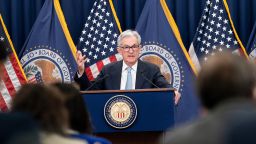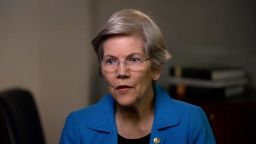A version of this story first appeared in CNN Business’ Before the Bell newsletter. Not a subscriber? You can sign up right here. You can listen to an audio version of the newsletter by clicking the same link.
The Federal Reserve is widely expected to raise its benchmark interest rate again on Wednesday, lifting it above 5% for the first time since 2006 as it works to bring down stubborn inflation.
But doing so risks sending shockwaves through the economy and markets, fanning recession fears and concerns about financial stability amid an ongoing crisis in the banking sector.
“Financial stability is subordinate to the effort to restore price stability” at the moment, Joseph Brusuelas, chief economist at RSM US, told CNN.
Step back: The Fed has swiftly raised interest rates in a bid to tame inflation, which fell to an annual rate of 5% in March but remains way above its target. Investors expect the central bank will announce another quarter-point increase today before signaling a pause.
That would allow policymakers to assess the consequences of the rate hikes enacted to date, which take time to feed through financial markets and the economy.
The consequences of higher borrowing costs have started to show. The unemployment rate stood at 3.5% in the United States in March. However, job openings that month tumbled to their lowest level since May 2021, according to data released Tuesday. Layoffs jumped by nearly 250,000 to 1.8 million — the highest level since December 2020.
So far, companies have maintained a robust pace of hiring, helping absorb laid-off workers, according to Diane Swonk, chief economist at KPMG. Yet that will change as companies find it harder to access credit, pushing firms to trim investment and costs.
The Fed has predicted the unemployment rate will rise to 4.5% this year and 4.6% next year. That level of joblessness would imply the economy is in recession, Swonk said.
“It’s stunning to me that the US economy has been as resilient as it has been,” she said. “We also know policy works with a lag, and the worst is yet to come.”
Meanwhile, investors are still coming to terms with the rapid run-up in rates, which sparked a huge sell-off in US government bonds and stocks last year.
Banks that failed to adequately prepare have been hammered. The shifting landscape paved the way for the collapse of Silicon Valley Bank in March and First Republic Bank this week.
More pain could be on the way. The commercial real estate sector, which is very sensitive to high interest rates, looks particularly vulnerable — its problems made worse by a glut of empty office buildings in the wake of the pandemic.
The Fed knows it’s pushing rates to an uncomfortable level. In many ways, that’s the point. The central bank wants to dampen Wall Street’s animal spirits and crimp demand for goods and services so inflation returns to a more manageable level and stays there.
But Sheila Bair, the former head of the US Federal Deposit Insurance Corporation, told CNN this week she’s worried about this aggressive strategy, which could pile undue stress on the banking system and the economy. She’s argued for months the Fed needs to take a time-out.
“Hitting pause doesn’t mean you’re giving up the fight,” said Bair, who led the FDIC through the Great Recession. “It just means you’re taking a breather and assessing what you’ve accomplished so far.”
JPMorgan’s size swells as bank crisis rumbles on
JPMorgan Chase (JPM) has once again come to the rescue of the banking system by acquiring a doomed bank. That makes Elizabeth Warren very worried.
By blessing JPMorgan’s takeover of First Republic Bank, the Democratic US senator fears federal regulators just made the “too big to fail” problem even worse.
“What happened here is because a bank was under-regulated and started to fail, the federal government has helped JPMorgan Chase get even bigger,” Warren told CNN on Tuesday in her first on-camera interview about the First Republic failure.
The backstory: JPMorgan agreed to pay the Federal Deposit Insurance Corporation $10.6 billion to buy most of First Republic after regulators shut the large regional bank. To the relief of investors and bank customers, the JPMorgan deal protects all of First Republic’s depositors.
“It may look good today while everything’s flying high, but ultimately if one of those giant banks, JPMorgan Chase, starts to stumble, the American taxpayers are the ones who will be on the line,” Warren said.
Warren thinks a different bank should have been allowed to buy First Republic.
“There were multiple bidders here and every other bidder was a lot smaller than JPMorgan Chase. My view on this is it’s important to look at the effect on competition and to try to keep a more diversified banking system,” Warren said. “Let somebody else buy this bank. Let somebody else take over those assets.”
Not over yet: Federal regulators had hoped that brokering the sale of First Republic would contain the banking crisis. That may have been wishful thinking. Shares of PacWest Bancor (PACW)p, which is based in California, plunged 28% on Tuesday, while Arizona’s Western Alliance (WAL) dropped 15%.
Uber is riding high as Lyft struggles
Which fast-growing tech companies are running into trouble as the economy slows and borrowing costs rise?
Not Uber, which on Tuesday reported first quarter earnings that beat Wall Street’s expectations and sent its shares soaring 12%. Its stock has climbed 48% year-to-date, versus the S&P 500’s 7% rise.
Details, details: The company brought in $8.8 billion in revenue in the first three months of the year, up 29% from the same period in 2022. That heartened investors, who cheered the signal that consumers are still spending on ride-sharing and food delivery.
“Uber is off to a strong start in 2023,” CEO Dara Khosrowshahi said. Even with higher interest rates and tighter access to funding, the company is “well positioned” to improve its competitiveness in key markets, he added.
Winning the rivalry: Lyft has not fared as well. Last month, it announced it would cut 26% of its workforce as it tries to control costs. The company recently replaced its CEO and said its founders would exit their management positions. (Lyft reports results on Thursday.)
The decision to invest in food and grocery delivery during the pandemic has become a big advantage for Uber. That business is still growing. Uber is also building it out as an advertising platform.
"come" - Google News
May 03, 2023 at 10:06PM
https://ift.tt/RinrmEh
Worse to come for the economy as rates top 5% - CNN
"come" - Google News
https://ift.tt/dwkGD4e
Shoes Man Tutorial
Pos News Update
Meme Update
Korean Entertainment News
Japan News Update
Bagikan Berita Ini
















0 Response to "Worse to come for the economy as rates top 5% - CNN"
Post a Comment